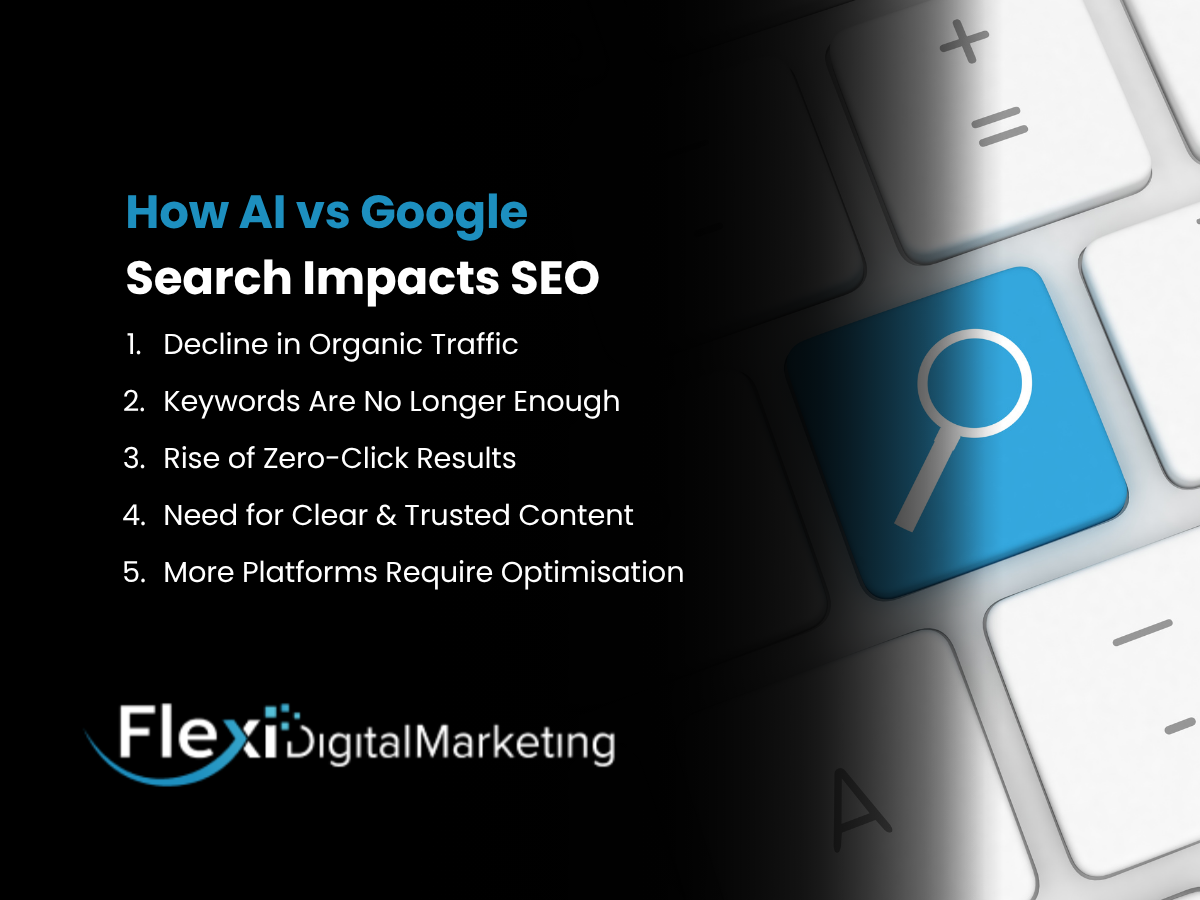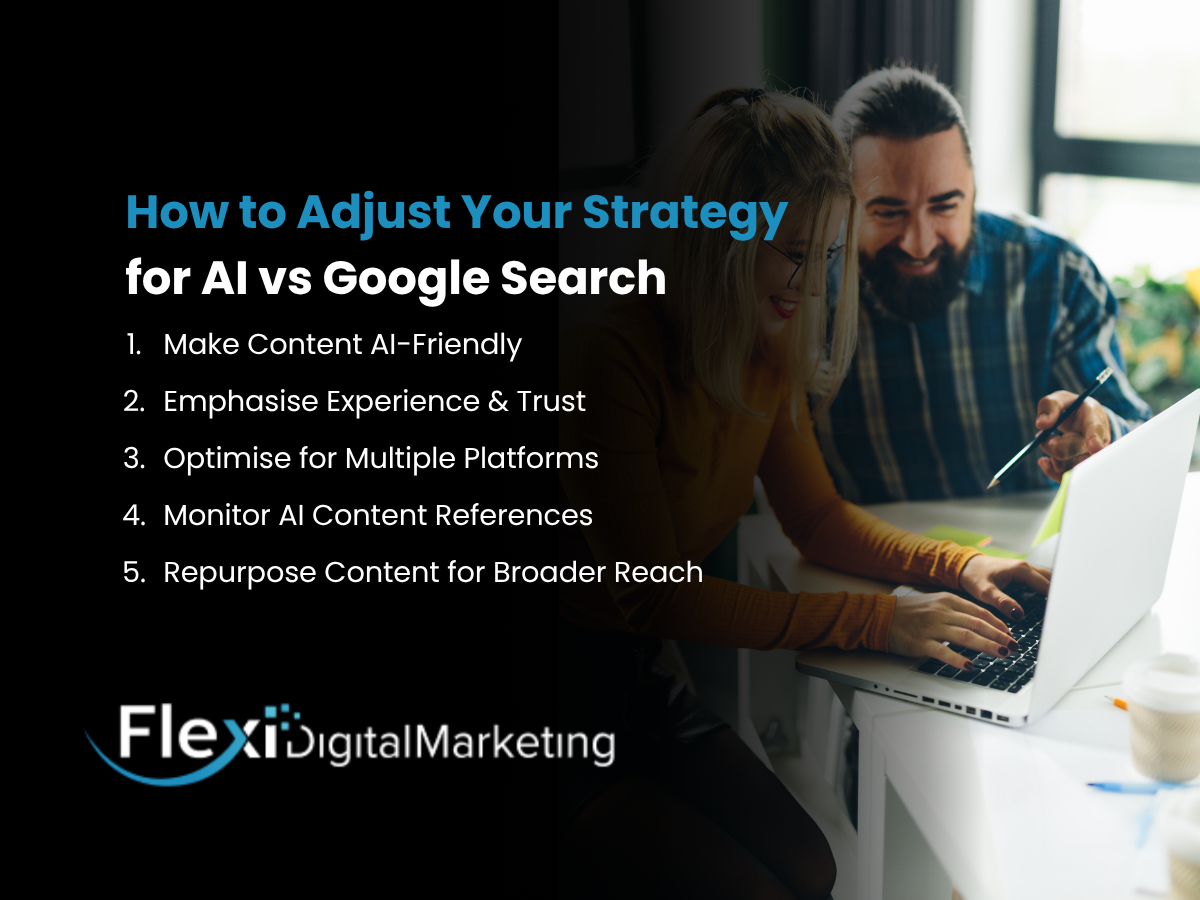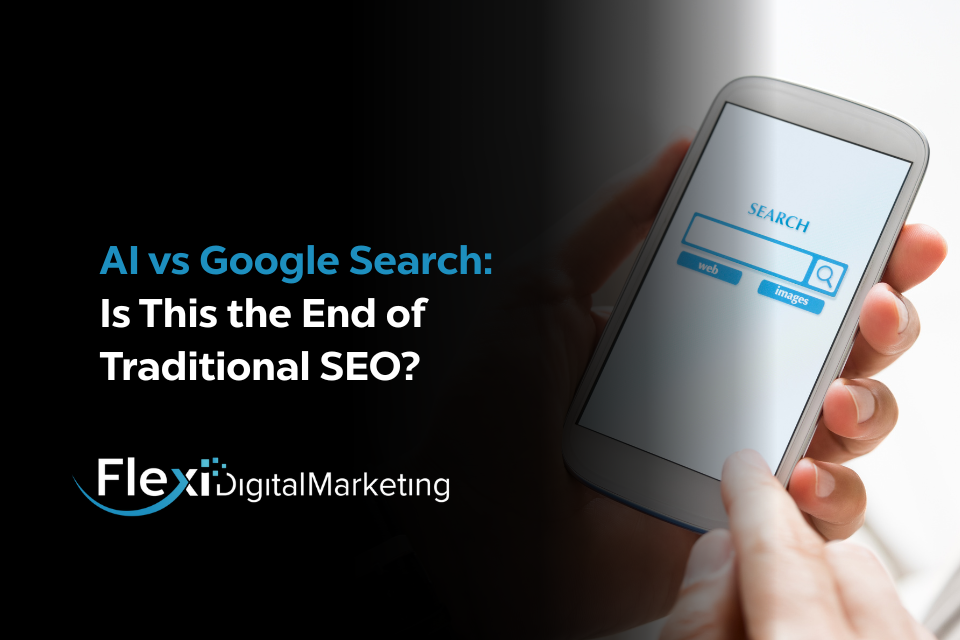The way people search for information is changing faster than ever. More users are turning to AI tools like ChatGPT instead of typing their queries into Google. This shift isn't just a trend, it's a signal that the digital landscape is going through a big change. As marketers and business owners, it’s important to understand what this change means.
AI vs Google Search is more than a tech shift. It shows how we now discover, trust, and interact with content. The power of AI in digital marketing is changing the rules that Google once set. Knowing how each platform works will help you stay ahead. Let’s break down what’s really happening and why it matters to you.
Understanding AI vs Google Search
AI search tools like ChatGPT, Claude and Perplexity give direct answers rather than showing a list of websites. They offer a conversation-style experience that feels more human and less cluttered. Users no longer need to open multiple tabs or scroll through ads to get what they need. This is one reason AI search is becoming more appealing.
On the other hand, Google is still used by billions because it's fast, reliable and rich with options. But with AI simplifying the search journey, people are beginning to shift their habits. The moment someone chooses to ask a chatbot instead of Googling a question, the power of AI search becomes clear. It’s this subtle change that signals a bigger disruption ahead.
Key Differences Between AI & Google Search
AI search is shaking up the way we look for information online. Understanding how it compares to Google Search can help you adapt your content and stay ahead.
Feature | Google Search | AI-Powered Search |
Response Style | List of links with snippets | Direct conversational answers |
Source of Information | Indexed web pages ranked by SEO | Trained on diverse datasets and real-time browsing |
User Interaction | One-way search experience | Interactive, ongoing Q&A |
Content Discovery | Relies on keywords and backlinks | Prioritises clarity, context and structured data |
Search Goal | Direct users to websites | Provide answers without needing external clicks |
| Content Selection Criteria | Rankings, domain authority, relevance | Factual accuracy, clarity and trustworthiness |
How AI vs Google Search Impacts SEO
AI is changing the rules of online visibility. If your content isn’t adapting, it could be left behind while AI takes centre stage in search behaviour.

1. Decline in Organic Traffic
Many websites are seeing a drop in clicks from search engines. AI often provides answers without linking to source websites, cutting out the middle step. This means your content may be read but never visited. It's a wake-up call for those relying solely on traditional SEO.
2. Keywords Are No Longer Enough
In the world of AI, content is judged by clarity, context and relevance. Just adding keywords won’t guarantee visibility in AI-generated answers. Your SEO strategies should now focus on writing like you're answering a question, not stuffing terms. Focus on helpful, natural content that solves problems quickly.
3. Rise of Zero-Click Results
Google has already introduced features where users get answers without leaving the page. AI takes this even further by summarising information instantly. This makes it harder for websites to earn clicks, even if they rank well. The SEO game is no longer just about ranking first.
4. Need for Clear & Trusted Content
AI tools pull from high-quality sources they can trust. Well-organised articles with proper headings, clear answers and accurate information are more likely to be picked up. Think of your content as a resource that’s easy to understand at a glance. Authority and format now go hand in hand.
5. More Platforms Require Optimisation
Visibility is no longer just about Google. People are searching on TikTok, Reddit and through AI apps. This means marketers must expand their reach and optimise for more than one platform. Being found means being where your audience is looking, not just where Google points them.
How to Adjust Your Strategy for AI vs Google Search
As AI reshapes the way people search, relying on old SEO tactics won’t cut it. To stay visible, brands need to adapt fast and rethink how their content gets found.

1. Make Content AI-Friendly
Use simple, clear language that directly answers user questions. Organise your content with headings, bullet points and summaries. This helps AI understand and pull from your page more easily. You're writing for both humans and machines now.
2. Emphasise Experience & Trust
Show your real-world expertise through case studies, testimonials or hands-on insights. AI favours content that comes from experience and provides genuine value. Don’t just tell people what you know, show them how you’ve done it. Building trust will get you noticed by both search engines and AI models.
3. Optimise for Multiple Platforms
Don’t rely on Google alone for traffic. Share content on social media, newsletters and AI-integrated apps. Use marketing automation to manage these touchpoints and reach users more efficiently. A multi-channel approach is your safety net.
4. Monitor AI Content References
Keep an eye on whether your site is being used by tools like ChatGPT or Perplexity. Use analytics and explore platforms that track AI content usage. This gives you an edge in understanding where you’re visible and where you’re not. Stay informed so you can adapt quickly.
5. Repurpose Content for Broader Reach
Turn blog posts into short videos, infographics or social threads. AI pulls from various media formats, not just articles. Repurposing boosts your chances of being surfaced across different channels. One idea can turn into many forms of discovery.
Will AI Replace Google Search or Will They Coexist?
Google is not sitting still. With Gemini and the Search Generative Experience, they’re blending AI into their own products. They're evolving to meet the challenge, but it’s still early days. Whether they can retain dominance depends on how quickly they adapt.
AI, meanwhile, is winning users with speed and simplicity. For quick answers, people are skipping Google altogether. But for deeper research, product discovery and local results, Google still holds ground. Each platform plays a different role in the user journey.
Chances are they will coexist. AI will handle fast answers and insights, while Google remains the go-to for exploration and discovery. The lines are blurring, and marketers must learn to play on both sides. It's not a matter of picking one over the other, but knowing how to use both wisely.
Final Thoughts
AI vs Google Search is not a passing phase. It’s a major shift in how users engage with information and how content gets discovered. Instead of resisting, it’s time to learn the new rules and adjust your strategy.
Stay visible by thinking beyond rankings. Focus on clarity, authority and being useful wherever your audience is searching. Whether it’s Google or AI, those who deliver value will always stand out. Keep evolving and you’ll stay ahead of the curve.
Ready to future-proof your SEO in the age of AI? Contact us to optimise your strategy and stay visible across both search engines and AI platforms.


